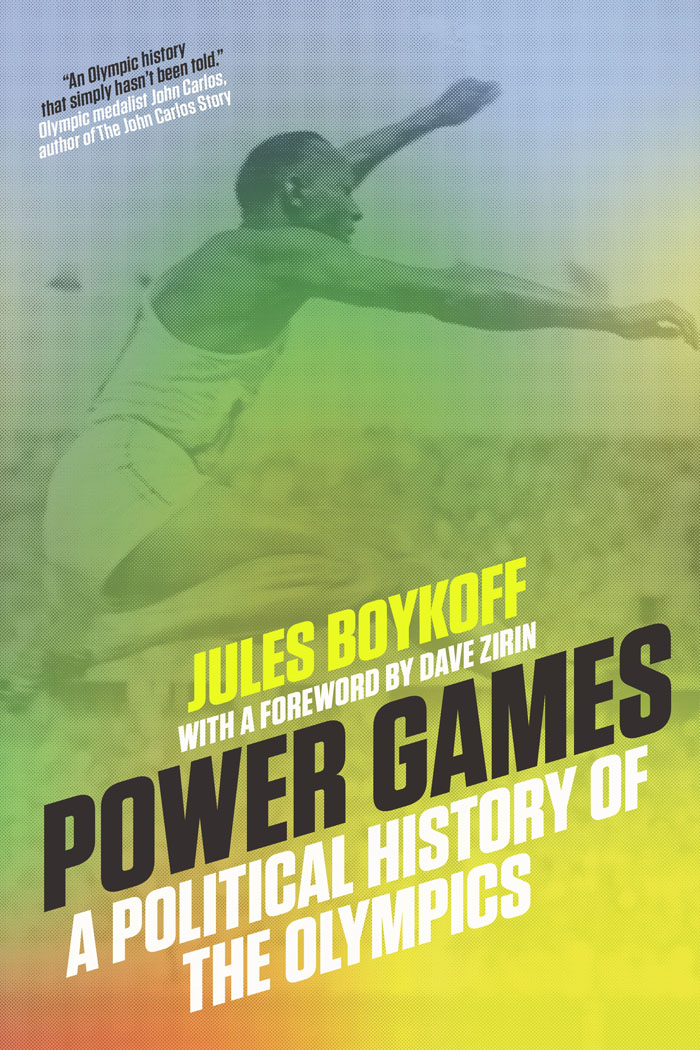Like this article? rabble is reader-supported journalism. Chip in to keep stories like these coming.
As all eyes turn to Rio in anticipation of the 2016 Summer Olympics, those of us who have even the smallest inkling of the negative impact of the Games on host city residents can only shudder.
In light of the typical parade of maudlin media tributes to athletic prowess and Olympic success, it is refreshing to read Jules Boykoff’s brisk and powerful account of political resistance to the Olympic behemoth, past and present, Power Games: A Political History of the Olympics.
Spanning from the start of the modern Olympics in 1896 to pre-Games resistance in Rio, this book provides a much-needed antidote to the recurrent and nauseating claim by the International Olympic Committee that the Olympics are not political. Because the Games are political, and always have been.
If you have young children, as I do, you probably share in the experience of watching them be bombarded by pro-Olympic propoganda every two years at their preschool and school. Nary a mention is made in all of this “Olympic education” of the speckled political past and present of this footloose sporting and cultural event.
This is unfortunate. I would like my daughter to know that the founder of the Olympics, Pierre de Coubertin, was vehemently opposed to women’s participation in the Games. I would also like her to know about the alternative Women’s Olympics that was started in 1922 by female athletes frustrated by their exclusion from the male dominated Games.
They would hold four Women’s Olympics over the course of the following decade, the largest of these drawing over 15,000 spectators. My son, who loves to run, ought to know that the iconic image of track stars Tommie Smith and John Carlos protesting poverty and racism on the podium in the 1968 Mexico Olympics resulted in their suspension from the Olympic team, orchestrated by then-president of the IOC, Avery Brundage.
It is these histories, and more, that Boykoff documents in fascinating detail in his book.
Power Games does more than re-hash history, however — albeit a history that has hitherto been scattered and needed to be brought between the covers of one book, as Boykoff has done. It also makes important contributions to our knowledge of recent and ongoing social movements that are resisting the Olympics.
While some of this material is covered in one of Boykoff’s other books, Activism and the Olympics, in Power Games, he brings these pieces together into a narrative arc that demonstrates the ongoing efforts of the IOC and national governments to repress dissent, as well as the heroic actions by grassroots organizers to resist the Games.
He draws here not only on his own first-hand research with activists in Vancouver and London (for the 2010 and 2012 Olympics), but also on his very recent fieldwork in Brazil in the lead-up to the Rio Games.
His description of a walk through Rio favela Vila Autódromo paints a vivid picture of a community that has been decimated by the Olympics development — over 90 per cent of residents had been displaced by 2015 — yet continues to sprout pockets of resistance, complete with colourful graffiti slogos that mock the Olympic project. These are the stories I want my children to hear.
Boykoff is an academic, and an accomplished one. But he has written this book intentionally for a public audience. It thus benefits from the best of both worlds; every fact is meticulously researched and referenced, yet it is also an easy and enjoyable read.
I particularly appreciate his colourful and often hilarious turns of phrase. One of my favorites: “assertions of Olympic sustainability are hocus-pocus, a harbinger of hooey,” and another, “the Olympic Truce is sort of like a unicorn bought with a bucket of Bitcoin.”
Power Games is an important book, and a timely one. The stories it contains are complex, but its message is simple: the Olympics are not what they seem. The benefits that are supposed to trickle down to everyday residents of host cities do not materialize.
As sports journalist Dave Zirin notes in the Foreword: “These are words as weapons: armaments for those who won’t have games played on their backs.”
These word-weapons can help future potential host city residents fight back, and maybe one day they’ll result in a real reckoning with the actual legacy of the Olympics.
Jacqueline Kennelly is the author of Olympic Exclusions: Youth, Poverty, and Social Legacies and an Associate Professor in the Department of Sociology and Anthropology at Carleton University in Ottawa, Canada.



